Cat's Early Morning Food Demands Causes Tension Between Couple
Cats are probably the cutest pets out there, and millions of people know this. These adorable felines are responsible for making several people happy daily, and they do so without breaking a sweat.
Yet, like every good thing, owning a cat has some downsides too. For one, cats are famous for disliking change and needing lots of time to adjust to new environments.
While some cats can adapt to new places or people in a few hours, others may take weeks or months. During this adaptation period, it can be pretty challenging to manage a cat.
However, with patience and love, it is possible. Unfortunately, not everyone can deal with the difficult behaviors that cats exhibit during this process.
We found a story on the AITA community on Reddit that paints a similar picture. OP shared that they had a six-year-old cat who had only lived in their old apartment before.
When they moved halfway across the country for a job, the cat found it difficult to adjust, as it was a new time zone. OP also stated that the cat had been waking them up by 4 AM for breakfast.
However, to allow the cat to adjust to the new time zone, OP had been ignoring it. Their boyfriend didn’t agree that OP should continue to do this, as it disturbed his sleep.
This led OP to ask the AITA question. Scroll down to see the verdict!
Let's dig into the details

OP and their boyfriend moved halfway across the country due to their boyfriend's new job. Unfortunately, OP's 6-year-old cat has been struggling to adapt to the new environment
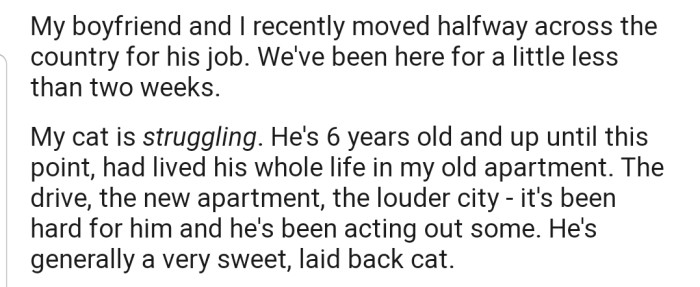
In addition, the new time zone has altered the cat's internal food clock. Consequently, OP and their boyfriend have to deal with the cat screaming for breakfast by 4 AM.
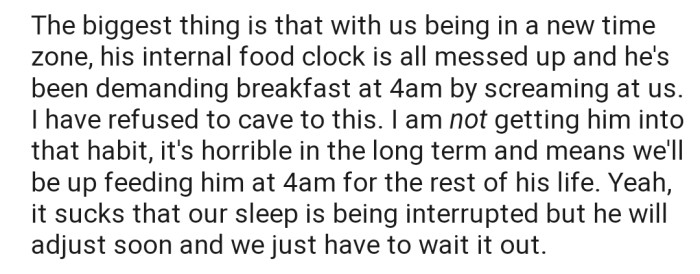
Understanding Feline-Induced Stress
According to Dr. Rachel Adams, a clinical psychologist at Harvard Medical School, the phenomenon of animals causing relational tension often stems from deeper stressors within the couple's relationship.
Her research indicates that external stressors, like a pet's demands, can exacerbate existing issues, making small annoyances feel monumental.
This pattern suggests that unresolved conflicts often manifest in seemingly trivial scenarios, thus turning a cat's early morning demands into a battleground for larger relational tensions.
The Impact of Pets on Relationships
Dr. Angela Smith, a relationship psychologist, points out that pets often serve as emotional anchors in relationships, but they can also become sources of tension if not managed properly.
Her research emphasizes that the way partners share responsibility for pet care can reflect deeper issues of communication and cooperation in their relationship.
This dynamic is particularly pronounced when one partner feels their needs are overlooked, leading to resentment and conflict.
Now OP's boyfriend is blaming them for not being able to put their cat under control

A little more info

"Your cat will get on the new schedule soon. He will adapt."

A behavioral psychologist notes that pets can serve as both a source of comfort and stress in relationships.
Studies show that when couples disagree about pet care, it often reflects underlying compatibility issues regarding parenting styles, responsibility, and communication.
Understanding the root of these disagreements is crucial; couples may need to explore their expectations and values regarding pets to resolve the tension effectively.
According to Dr. Alexandra Solomon, a relationship therapist, "Effective communication about shared responsibilities is key to a healthy partnership." Couples who openly discuss their expectations and pet care often experience greater relationship satisfaction. She emphasizes that fostering a collaborative environment not only strengthens the bond between partners but also enhances their overall happiness together. Engaging in these discussions can help alleviate tension and create a more harmonious home life.
"Absolutely NOT the a-hole. You are being a responsible cat owner, and your cat will adjust."
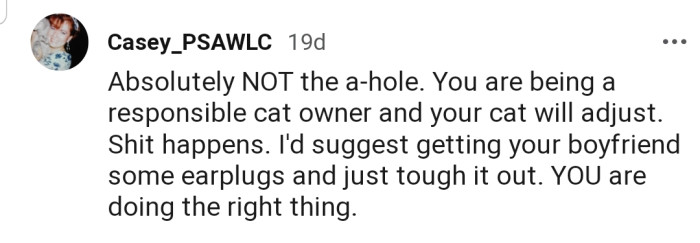
"Absolutely don’t cave to kitty noises at night unless you suspect something bad has happened."

"I get why your boyfriend is unhappy right now, but this is just how cats work, and I fully agree you should not give in."
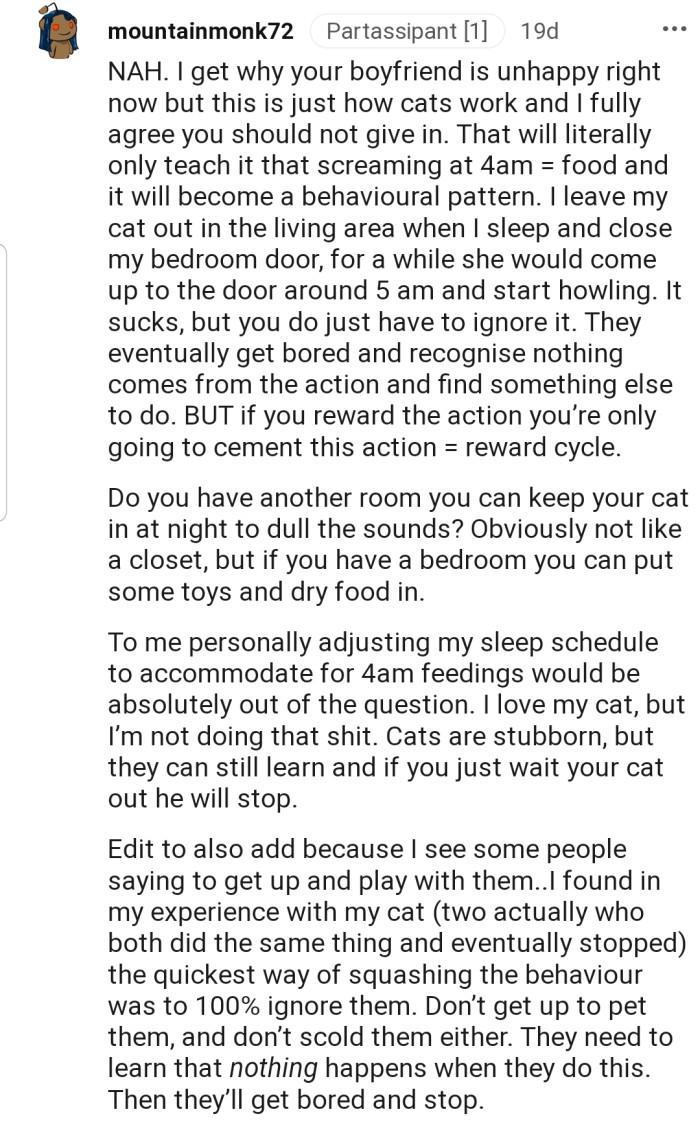
Practical Solutions for Couples
To address the tension created by a pet's demands, couples should engage in open dialogue about their feelings.
Conflict resolution strategies, such as using 'I' statements, can help express feelings without assigning blame. For instance, saying 'I feel overwhelmed when the cat wakes me up early' focuses on the speaker's experience rather than criticizing the partner.
Moreover, setting structured pet care routines can alleviate some pressure, allowing couples to work together to meet their pet's needs while respecting each other's space.
Communication Strategies for Couples
To address the tensions arising from pet care, couples can benefit from employing effective communication strategies that prioritize active listening and empathy.
Psychological research suggests that using 'I' statements, such as 'I feel overwhelmed when I have to handle the pet's needs alone,' can help partners express their feelings without placing blame.
This approach encourages a more supportive dialogue, allowing both partners to feel heard and validated.
"NTA. I'd back your instincts. Feed him when you want to get up and give him lots of love then. Ignore him when you want to be asleep."

"Cats are famous (or notorious?) for training us. Haha."

"The cat will get used to the new schedule soon enough."

Interestingly, research published in the Journal of Personality and Social Psychology indicates that couples who share pet responsibilities often report stronger relationship satisfaction.
The act of caring for a pet together can enhance bonding experiences, fostering teamwork and cooperation.
This suggests that despite the initial tensions, couples can leverage their shared love for their pet to enhance their emotional connection, turning a source of conflict into a bonding activity.
A practical recommendation is to establish a pet care schedule together, ensuring both partners feel involved and responsible.
Involving both partners in pet-related decisions can enhance their sense of teamwork, transforming pet care into a shared activity rather than a source of conflict.
Additionally, couples can consider seeking counseling to develop stronger communication skills if tensions persist, as professional guidance can provide valuable insights into their dynamic.
"There's no reason that your cat should be suffering needlessly if you are willing to try avenues to make that adjustment easier."
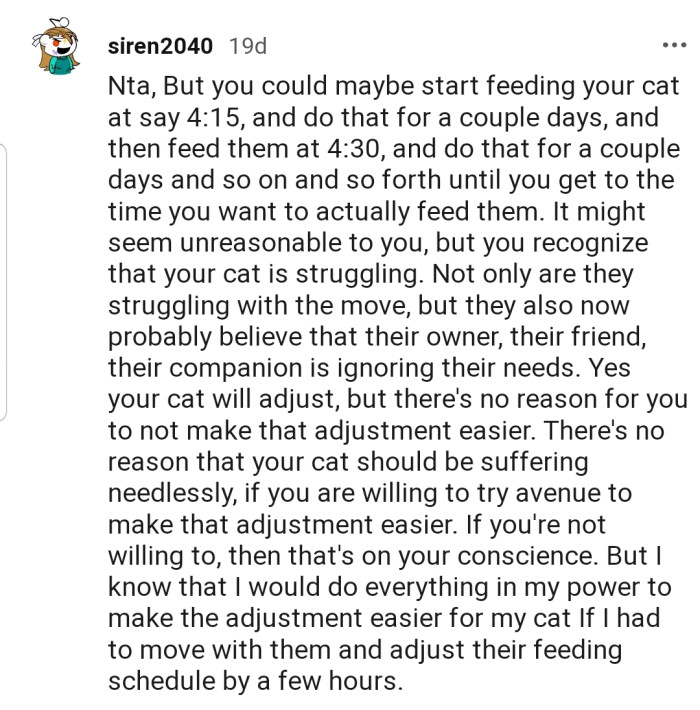
"I think if you cave and feed him during the night, he’ll learn that meowing at 4 AM gets him food, and he’ll do it more."

"No, you shouldn't be getting up super early and reinforcing the cat's behavior."
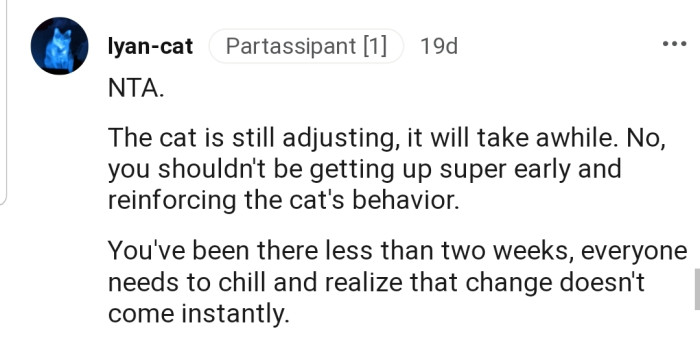
The commenters believe OP is NTA. However, they didn’t feel the same way about their boyfriend.
According to them, the cat will adjust, and OP is right for not responding to it. There's no doubt that reinforcing such behavior will be detrimental to the adaptation process.
Do you have any advice that can help OP better deal with the situation? Let us know in the comments below!
Psychological Analysis
This situation illustrates how pets can serve as both bonding tools and sources of stress in relationships.
From our perspective, it's vital for couples to approach these challenges collaboratively, fostering communication that strengthens their partnership.
Analysis generated by AI
Analysis & Alternative Approaches
Couples facing challenges with pet care should remember that effective communication is key to maintaining a healthy relationship.
Research underscores that addressing underlying issues through open dialogue can lead to greater mutual understanding and satisfaction.
Psychological Analysis
This situation illustrates a common dynamic where external stressors, like pet care, highlight existing relational conflicts. In essence, a couple's ability to navigate these issues often reflects their overall communication and conflict resolution skills.
Analysis generated by AI
Analysis & Alternative Approaches
Research indicates that conflicts arising from pet care can mirror deeper relational dynamics.
As Dr. Adams notes, understanding the underlying issues can transform these conflicts into opportunities for growth, allowing couples to strengthen their relationships.



